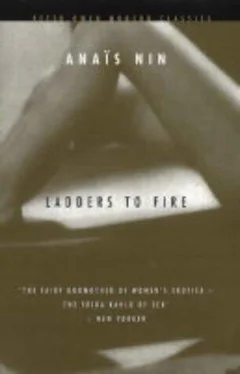Anaïs Nin - Ladders to Fire
Здесь есть возможность читать онлайн «Anaïs Nin - Ladders to Fire» весь текст электронной книги совершенно бесплатно (целиком полную версию без сокращений). В некоторых случаях можно слушать аудио, скачать через торрент в формате fb2 и присутствует краткое содержание. Год выпуска: 2004, ISBN: 2004, Издательство: Peter Owen Limited, Жанр: Классическая проза, Эротические любовные романы, на английском языке. Описание произведения, (предисловие) а так же отзывы посетителей доступны на портале библиотеки ЛибКат.
- Название:Ladders to Fire
- Автор:
- Издательство:Peter Owen Limited
- Жанр:
- Год:2004
- ISBN:9780720611625
- Рейтинг книги:5 / 5. Голосов: 1
-
Избранное:Добавить в избранное
- Отзывы:
-
Ваша оценка:
- 100
- 1
- 2
- 3
- 4
- 5
Ladders to Fire: краткое содержание, описание и аннотация
Предлагаем к чтению аннотацию, описание, краткое содержание или предисловие (зависит от того, что написал сам автор книги «Ladders to Fire»). Если вы не нашли необходимую информацию о книге — напишите в комментариях, мы постараемся отыскать её.
Cities of the Interior
Children of the Albatross
The Four-Chambered Heart
A Spy in the House of Love
Solar Barque
Ladders to Fire — читать онлайн бесплатно полную книгу (весь текст) целиком
Ниже представлен текст книги, разбитый по страницам. Система сохранения места последней прочитанной страницы, позволяет с удобством читать онлайн бесплатно книгу «Ladders to Fire», без необходимости каждый раз заново искать на чём Вы остановились. Поставьте закладку, и сможете в любой момент перейти на страницу, на которой закончили чтение.
Интервал:
Закладка:
One night Djuna and Lillian went to a night club together to watch the cancan. At such a moment Djuna forgot that she was a woman and looked at the women dancing with the eyes of an artist and the eyes of a man. She admired them, reveled in their beauty, in their seductions, in the interplay of black garters and black stockings and the snow-white frills of petticoats.
Lillian’s face clouded. The storm gathered in her eyes. The lightning struck. She lashed out in anger: “If I were a man I would murder you.”
Djuna was bewildered. Then Lillian’s anger dissolved in lamentations: “Oh, the poor people, the poor people who love you. You love these women!”
She began to weep. Djuna put her arms around her and consoled her. The people around them looked baffled, as passers-by look up suddenly at an unexpected, freakish windstorm. Here it was, chaotically upsetting the universe, coming from right and left, great fury and velocity—and why?
Two women were looking at beautiful women dancing. One enjoyed it, and the other made a scene.
Lillian went home and wrote stuttering phrases on the back of a box of writing paper: Djuna, don’t abandon me; if you abandon me, I am lost.
When Djuna came the next day, still angry from the inexplicable storm of the night before, she wanted to say: are you the woman I chose for a friend? Are you the egotistical, devouring child, all caprice and confusion who is always crossing my path? She could not say it, not before this chaotic helpless writing on the back of the box, a writing which could not stand alone, but wavered from left to right, from right to left, inclining, falling, spilling, retreating, ascending on the line as if for flight off the edge of the paper as if it were an airfield, or plummeting on the paper like a falling elevator.
If they met a couple along the street who were kissing, Lillian became equally unhinged.
If they talked about her children and Djuna said: I never liked real children, only the child in the grown-up, Lillian answered: you should have had children.
“But I lack the maternal feeling for children, Lillian, though I haven’t lacked the maternal experience. There are plenty of children, abandoned children right in the so-called grown-ups. While you, well you are a real mother, you have a real maternal capacity. You are the mother type. I am not. I only like being the mistress. I don’t even like being a wife.”
Then Lillian’s entire universe turned a somersault again, crashed, and Djuna was amazed to see the devastating results of an innocent phrase: “I am not a maternal woman,” she said, as if it were an accusation. (Everything was an accusation.)
Then Djuna kissed her and said playfully: “Well, then, you’re a femme fatale !”
But this was like fanning an already enormous flame. This aroused Lillian to despair: “No, no, I never destroyed or hurt anybody,” she protested.
“You know, Lillian, someday I will sit down and write a little dictionary for you, a little Chinese dictionary. In it I will put down all the interpretations of what is said to you, the right interpretation, that is: the one that is not meant to injure, not meant to humiliate or accuse or doubt. And whenever something is said to you, you will look in my little dictionary to make sure, before you get desperate, that you have understood what is said to you.”
The idea of the little Chinese dictionary made Lillian laughe storm passed.
But if they walked the streets together her obsession was to see who was looking at them or following them. In the shops she was obsessed about her plumpness and considered it not an attribute but a defect. In the movies it was emotionalism and tears. If they sat in a restaurant by a large window and saw the people passing it was denigration and dissection. The universe hinged and turned on her defeated self.
She was aggressive with people who waited on her, and then was hurt by their defensive abandon of her. When they did not wait on her she was personally injured, but could not see the injury she had inflicted by her demanding ways. Her commands bristled everyone’s hair, raised obstacles and retaliations. As soon as she appeared she brought dissonance.
But she blamed the others, the world.
She could not bear to see lovers together, absorbed in each other.
She harassed the quiet men and lured them to an argument and she hated the aggressive men who held their own against her.
Her shame. She could not carry off gallantly a run in her stocking. She was overwhelmed by a lost button.
When Djuna was too swamped by other occupations or other people to pay attention to her, Lillian became ill. But she would not be ill at home surrounded by her family. She was ill alone, in a hotel room, so that Djuna ran in and out with medicines, with chicken soup, stayed with her day and night chained to her antics, and then Lillian clapped her hands and confessed: “I’m so happy! Now I’ve got you all to myself!”
The summer nights were passing outside like gay whores, with tinkles of cheap jewelry, opened and emollient like a vast bed. The summer nights were passing but not Lillian’s tension with the world.
She read erotic memoirs avidly, she was obsessed with the lives and loves of others. But she herself could not yield, she was ashamed, she throttled her own nature, and all this desire, lust, became twisted inside of her and churned a poison of envy and jealousy. Whenever sensuality showed its flower head, Lillian would have liked to decapitate it, so it would cease troubling and haunting her.
At the same time she wanted to seduce the world, Djuna, everybody. She would want to be kissed on the lips and more warmly and then violently block herself. She thrived on this hysterical undercurrent without culmination. This throbbing sensual obsession and the blocking of it; this rapacious love without polarity, like a blind womb appetite; delighting in making the temperature rise and then clamping down the lid.
In her drowning she was like one constantly choking those around her, bringing them down with her into darkness.
Djuna felt caught in a sirocco.
She had lived once on a Spanish island and experienced exactly this impression.
The island had been calm, silvery and dormant until one morning when a strange wind began to blow from Africa, blowing in circles. It swept over the island charged with torpid warmth, charged with flower smells, with sandalwood and patchouli and incense, and turning in whirlpools, gathered up the nerves and swinging with them into whirlpools of dry enervating warmth and smells, reached no climax, no explosion. Blowing persistently, continuously, hour after hour, gathering every nerve in every human being, the nerves alone, and tangling them in this fatal waltz; drugging them and pulling them, and whirlpooling them, until the body shook with restlessness—all polarity and sense of gravity lost. Because of this insane waltz of the wind, its emollient warmth, its perfumes, the being lost its guidance, its clarity, its integrity. Hour after hour, all day and all night, the body was subjected to this insidious whirling rhythm, in which polarity was lost, and only the nerves and desires throbbed, tense and weary of movement—all in a void, with no respite, no climax, no great loosening as in other storms. A tension that gathered force but had no release. It abated not once in forty-eight hours, promising, arousing, caressing, destroying sleep, rest, repose, and then vanished without releasing, without culmination…
This violence which Djuna had loved so much! It had become a mere sirocco wind, burning and shriveling. This violence which Djuna had applauded, enjoyed, because she could not possess it in herself. It was now burning her, and their friendship. Because it was not attached to anything, it was not creating anything, it was a trap of negation.
Читать дальшеИнтервал:
Закладка:
Похожие книги на «Ladders to Fire»
Представляем Вашему вниманию похожие книги на «Ladders to Fire» списком для выбора. Мы отобрали схожую по названию и смыслу литературу в надежде предоставить читателям больше вариантов отыскать новые, интересные, ещё непрочитанные произведения.
Обсуждение, отзывы о книге «Ladders to Fire» и просто собственные мнения читателей. Оставьте ваши комментарии, напишите, что Вы думаете о произведении, его смысле или главных героях. Укажите что конкретно понравилось, а что нет, и почему Вы так считаете.












